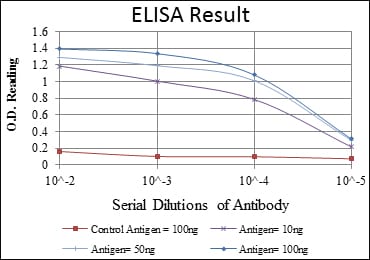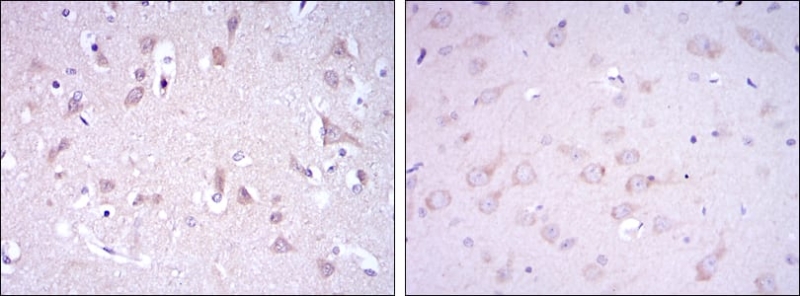

| WB | 咨询技术 | Human,Mouse,Rat |
| IF | 咨询技术 | Human,Mouse,Rat |
| IHC | 1/50-1/100 | Human,Mouse,Rat |
| ICC | 1/100-1/500 | Human,Mouse,Rat |
| FCM | 咨询技术 | Human,Mouse,Rat |
| Elisa | 咨询技术 | Human,Mouse,Rat |
| Aliases | GLUR3; GLURC; GluA3; MRX94; GLUR-C; GLUR-K3 |
| Entrez GeneID | 2892 |
| clone | 1D2 |
| WB Predicted band size | 101kDa |
| Host/Isotype | Mouse IgG1 |
| Antibody Type | Primary antibody |
| Storage | Store at 4°C short term. Aliquot and store at -20°C long term. Avoid freeze/thaw cycles. |
| Species Reactivity | Human |
| Immunogen | Purified recombinant fragment of human GRIA3 expressed in E. Coli. |
| Formulation | Ascitic fluid containing 0.03% sodium azide. |
+ +
以下是关于PHCA(抗血小板HPA抗体)的参考文献示例,供参考:
---
1. **文献名称**: *Clinical significance of platelet-specific antibodies in immune thrombocytopenia*
**作者**: Chong BH, et al.
**摘要**: 探讨了血小板特异性抗体(包括HPA抗体)在免疫性血小板减少症(ITP)中的诊断价值,发现PHCA抗体阳性与疾病活动性及治疗反应相关。
---
2. **文献名称**: *Human platelet antigen antibodies in fetal and neonatal alloimmune thrombocytopenia*
**作者**: Kaplan C, et al.
**摘要**: 研究HPA抗体(如抗-HPA-1a)在胎儿和新生儿同种免疫性血小板减少症中的作用,强调PHCA检测对产前诊断及临床管理的意义。
---
3. **文献名称**: *Laboratory testing for platelet antibodies: current status and future directions*
**作者**: Peterson JA, et al.
**摘要**: 综述了血小板抗体(包括PHCA)的检测技术进展,比较了ELISA、流式细胞术等方法在临床中的应用与局限性。
---
4. **文献名称**: *Autoantibodies targeting platelet glycoproteins in autoimmune diseases*
**作者**: Nieswandt B, et al.
**摘要**: 分析了自身免疫性疾病中抗血小板糖蛋白抗体的病理机制,指出PHCA抗体可能通过破坏血小板生成或功能加重出血倾向。
---
**注**:PHCA抗体的研究多集中于血液系统疾病(如ITP、输血反应等),上述文献为示例,实际引用时建议通过PubMed或专业数据库核实最新研究。
The PHCA antibody, targeting phosphorylated Histone H3 (pHH3), is a critical tool in cellular and cancer research. Histone H3. a core component of nucleosomes, undergoes phosphorylation at specific residues (e.g., Ser10. Ser28) during mitosis, a process tightly linked to chromatin condensation and cell division. Antibodies against pHH3 detect this transient phosphorylation, enabling precise identification of cells in the mitotic phase. Unlike proliferation markers like Ki-67. which label cells throughout the cell cycle, pHH3 antibodies offer higher specificity for active mitosis, making them valuable for assessing tumor proliferation rates.
In oncology, pHH3 antibodies are widely used in immunohistochemistry and flow cytometry to evaluate tumor aggressiveness and patient prognosis. Studies in cancers such as neuroblastoma, breast cancer, and gliomas have shown that elevated pHH3 levels correlate with higher histological grades, metastatic potential, and poorer clinical outcomes. This marker also aids in predicting therapeutic responses, as highly proliferative tumors may resist conventional treatments.
Beyond cancer, pHH3 antibodies contribute to developmental biology and toxicology research, where mitotic activity quantification is essential. Their specificity and reliability have established pHH3 antibodies as a gold standard for mitotic indexing, bridging translational research and clinical diagnostics.
×